80 years ago today, the classic film Casablanca premiered on screens across the US. Beloved for the onscreen chemistry between the two lead actors, Humphrey Bogart and Ingrid Bergman, the film won three Academy Awards, including Best Picture, screenplay, and director—for Michael Curtiz. The signature line, “Here’s looking at you, kid,” was ranked No. 5 on AFI’s list of 100 greatest movie quotes of all time. WATCH an anniversary tribute from CBS Sunday Morning. (1943)
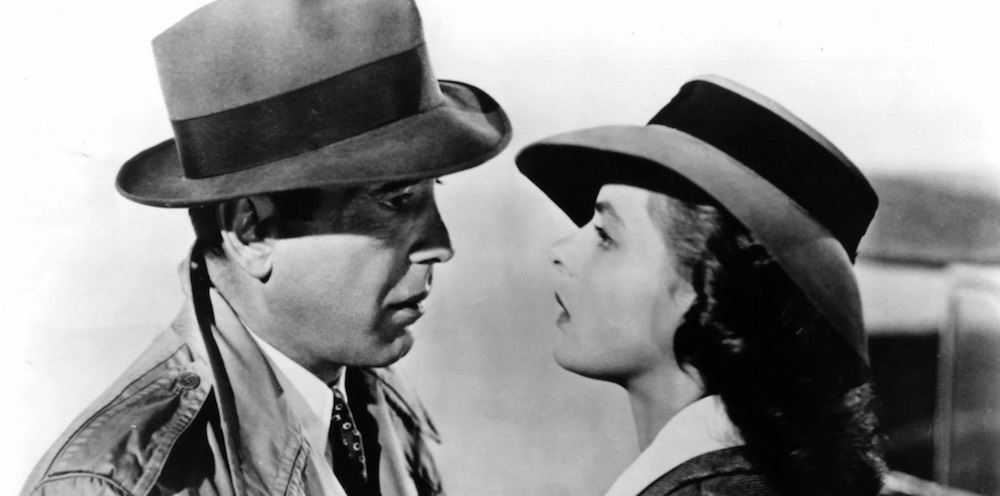
Named for the North African city where the story is set, Casablanca left us with other unforgettable lines from the World War II Resistance drama: Of all the gin joints in all the towns in all the world, she walks into mine; The problems of three little people don’t amount to a hill of beans in this crazy world; I think this is the beginning of a beautiful friendship; and perhaps the best closing line in cinema—We’ll always have Paris, uttered by Rick before he sends Ilsa off in an airplane, with the romantic theme song, As Time Goes By, playing amidst the fog.
In regards to that closing line, one of the writing staff was suggesting the screenplay be changed to kill off Lisa’s husband to allow Ilsa and Rick to live happily ever after, but Casey Robinson, a critical part of the writing team who was involved in several rewrites said that the end of the movie “sets up for a swell twist when Rick sends her away on the plane with Laszlo. For now, in doing so, he is not just solving a love triangle. He is forcing the girl to live up to the idealism of her nature, forcing her to carry on with the work that in these days is far more important than the love of two little people.”
Ingrid Bergman dished, “I watched the film the other day after not seeing it for a long time, and it was amazing how good that picture was.”
MORE Good News on this Date:
- The first bridge over the Mississippi River opened in Minnesota (1855)
- Charles Curtis, a Kansas attorney from the Kaw nation, became the first person with significant Native American ancestry to be elected as a US Senator, which led to his later becoming vice-president, under President Herbert Hoover (1907)
- The 24th Amendment to the US Constitution was ratified prohibiting election-day poll taxes (1964)
- A peace accord was reached between US & Vietnam (1973)
- National Handwriting Day in the USA was established on John Hancock’s birthday (1977)
- Sweden became the first nation to ban aerosol sprays protecting the Earth’s ozone layer (1978)
- The Rock and Roll Hall of Fame inducted its first members: Chuck Berry, Elvis Presley, James Brown, Ray Charles, Fats Domino, the Everly Brothers, Buddy Holly, and Jerry Lee Lewis (1986)
- The US Patent & Trademark Office revoked four key patents held by the pharmaceutical company Gilead Sciences on a previously-known drug, paving the way for cheap generic HIV/AIDS medicine for the developing world (2008)
40 years ago today, Arjen Robben was born. One of the greatest Dutch footballers in recent memory, and probably the best right winger in the world during his prime, he won league titles in England, the Netherlands, but particularly in Germany where he collected 8 Bundesliga titles with Bayern Munich, and won German player of the year in 2010. At international level, Robben barely missed out on The Netherlands’s first-ever World Cup win in 2010 when they fell in the final to Spain.

Born in Bedum, The Netherlands, Robben was spotted at an early age for scoring spectacular goals with his left foot. Signed by the regional team FC Groningen, he would go on to make his appearance in the top level of Dutch football at PSV Eindhoven in 2002-2003, where he helped win the title that year scoring 12 goals.
After a trophy-laden spell with London’s Chelsea, persistent injuries saw him sold to Real Madrid, and again to Bayern Munich, where his partnership with French winger Frank Ribbery earned the pair the affectionate nickname “Robbery.” Robben represented Holland 96 times, scoring 37 goals.
When he had no concern of being injured, Robben’s close control, dribbling, speed, and devastating shooting accuracy led to him being one of the most accomplished inside forwards in the sport. Indeed he won third place in the Ballon d’Or behind only Christiano Ronaldo and Messi. At his prime when Robben cut inside from the right wing with the ball on his left foot, there was no one more deadly in German football—perhaps world football, and if the ball nestled in the back of the net, it had a sense of inevitability about it. Watch a montage of Robben at his best… NOTE: The video below contains music with adult language. (1984)
192 years ago today, the father of impressionism, Edouard Manet, was born in Paris. He grew up to reject the legal career imagined for him to become the painter that would lead the transition from the realist to the impressionist styles.
His early masterworks, The Luncheon on the Grass (Le déjeuner sur l’herbe) and Olympia, both from 1863, caused great controversy and served as rallying points for the young painters who would create Impressionism. Today, these are considered watershed paintings that mark the start of modern art.
The last 20 years of Manet’s life saw him form bonds with other great artists of the time, such as Claude Monet, and develop his own simple and direct style that would be heralded as innovative and serve as a major influence for future painters.
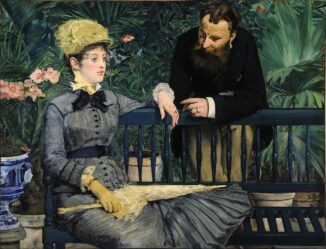
Edgar Degas, a famous impressionist master, said at Manet’s funeral that his gigantic scale as an artist could not be conscious by contemporaries, perhaps because Manet’s extreme focus on everyday life was seen as unimaginative. In his paintings, the “randomness” of the chosen moment was especially emphasized by the composition, which abounds with cuts of figures and objects, suggesting the possibility of continuing the image outside the canvas.
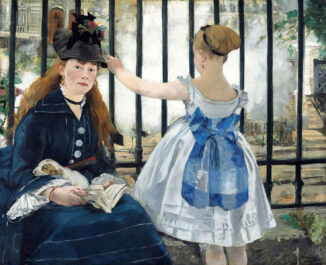
He also was an autodidact, educating himself by studying largely through quiet and detailed observation of the works within his native Louvre museum, but also the finest galleries in Holland, Italy, Germany, and Spain. (1832)
And, 175 years ago today, Elizabeth Blackwell became the first woman doctor in the United States. The local press boasted about the gender pioneer who graduated after becoming the first woman in the country to attend medical school. She chose the field after her friend fell ill and suggested that if a female doctor had cared for her, she might not have suffered so much.
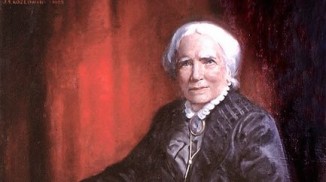
As a woman, Elizabeth Blackwell endured a lot of prejudice, as she was rejected from every medical school except one—Geneva College in New York (now, Hobart and William Smith Colleges). On graduation day, when the British-born student was receiving her diploma, the school’s dean, Dr. Charles Lee, stood up and bowed to her. (1849)
And, Happy 73rd Birthday to Captain Chesley Sullenberger who, in 2009, safely landed a jet airliner in the Hudson River saving all 155 passengers on board—and avoiding a disastrous crash into Manhattan.
The plane hit a flock of birds right after takeoff that knocked out both engines while 3,000 feet in the air. Nicknamed ‘Sully’, the Captain is retired from aviation now, but works as an author, speaker, and consultant.

In response to worldwide celebration of the incident he said, “I realized how this event had touched people’s lives, how ready they were for good news, how much they wanted to feel hopeful again,” said Sully afterward. “We’ve had a worldwide economic downturn, and people are just so ready for good news. They want to feel reassured that all the things we value, all our ideals, still exist.”
Actor Tom Hanks portrayed the pilot in Sully, a film about the ‘Miracle on the Hudson’. WATCH a spine-tingling Smithsonian video recreation of those 200 seconds… (1951)
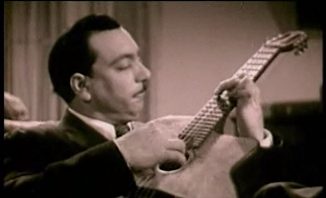
Also, 114 years ago today, the great jazz guitarist and composer Django Reinhardt was born. Regarded as one of the most influential musicians of the twentieth century, the Belgian-born Romani-French musician is known for playing with only two fingers. Here’s why: Reinhardt spent his youth in Romani encampments near Paris, where he played violin, banjo, and guitar. When he was 18 he was terribly burned in an accident that hospitalized him for 18 months and badly damaged the third finger (ring finger) and fourth finger (pinky) of Reinhardt’s left hand. Doctors believed he would never play guitar well again, but he regained his musical mastery by developing a radical method to play using his two remaining fingers.
With violinist Stéphane Grappelli, Reinhardt formed the Hot Club of France in 1934, a jazz group that was among the first to feature a guitar as lead instrument. It was the most accomplished and innovative European jazz band of the period.
He also played with American luminaries like Louis Armstrong and Duke Ellington. Despite never learning to read music, he experimented with classical composition, writing a Mass for the Gypsies, and a symphony—using an assistant to notate what he was improvising. One of his songs, Nuages, became an unofficial anthem in Paris to signify hope for liberation during the Nazi occupation in WWII. He was playing there throughout the war, but never rounded up, even though he was Romani. Django died suddenly of a stroke at age 43 in 1953. Charlie Byrd, among other jazz greats, called Reinhardt his primary influence. WATCH rare footage below of his lightening fast fingers… (1910)
(NOTE: Parental discretion may be advised during the last half of this biography when they describe his later personal choices…)
SHARE the Milestones, Masterpieces, Memories, and Music…




















[…] The Good News Network […]
[…] post Good News in History, January 23 appeared first on Good News […]
[…] Posted From: https://www.goodnewsnetwork.org/events070123/ […]